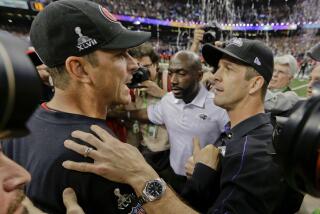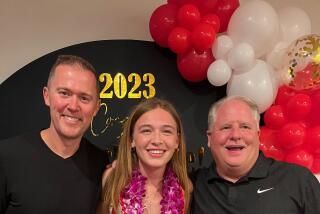Game Plan to Save Lives
I has been eight years now, and the old coach still searches.
He has helped raise millions of dollars and open nearly two dozen new labs, and the old coach still schemes.
He makes phone calls. He sends thank-you notes. He beats a drum until his 79-year-old hands are tired and his new knee and hips are sore.
It wasn’t supposed to be like this.
When Ara Parseghian drew something on a blackboard, it always worked.
It worked for 11 years and two national championships as the football coach at Notre Dame, then later as a broadcaster.
Everything he tried, he won. Everywhere he went, he was carried home on shoulders.
Then, eight years ago, he met something named Niemann-Pick Type C, a rare and incurable neurological condition that was diagnosed in three of his grandchildren.
“The most devastating day of my life,” he remembered.
One minute he was a 71-year-old, decorated retiree.
The next minute he was a desperate grandpa fighting for his family.
It was the fall of 1994. His son Mike and daughter-in-law Cindy came to him with the bad news, and asked for his help.
The old coach did more than that, helping build one of the fastest-growing and successful family foundations in the history of medicine.
The Ara Parseghian Medical Research Foundation.
Heard of it?
It has been in every major magazine and on every major sports show.
It has altered the course of study on a little-known disease that affects between 500-1,000 children in the United States.
It has brought hope in the form of a new drug trial.
But in March 1997, his grandson Michael died at age 9.
And in October 2001, his granddaughter Christa died at age 10.
And today, his last remaining afflicted grandchild Marcia, 14, can no longer eat without a tube or walk without assistance.
Her symptoms are so advanced, in fact, that she no longer qualifies for the drug trial that the foundation’s research recently made possible.
“I wouldn’t wish this on anybody,” Ara said.
So during this week of the renewal of a rivalry he helped make famous -- USC versus Notre Dame on Saturday at the Coliseum -- the old coach is still coaching.
But it has nothing to with football.
All this research that will one day help others ... would it be too much to ask that it help his own?
“Still looking for the silver bullet, the one silver bullet,” he said. “Looking for anything to save my grandchildren.”
*
There was a birthday party last week at the Fiesta bowling center in Tucson.
Did you hear the cheering? Could you feel the smiles?
Marcia Parseghian turned 14.
She couldn’t eat the cake. She needed someone to help her stand as she bowled.
But after several tries, amid much cheering from a couple dozen friends, she blew out all the candles.
While, across the country in his winter home, in Florida, the fire in her grandfather burned.
“We sent her some cosmetics, we called to wish her happy birthday
Those parents, Mike and Cindy, first learned of the disease in 1992, when son Michael’s development suddenly slowed in kindergarten.
He began falling a lot, his handwriting was poor, something was wrong.
A series of tests turned up Niemann-Pick Type C, which results in neurological deterioration by interfering with how cholesterol is used within cells.
Most children with Niemann-Pick Type C die in adolescence.
When two of Mike and Cindy’s three other children also tested positive, all three younger than 8, they knew they didn’t have much time.
“We got all the information together,” Cindy recalled. “Then we took it to the coach.”
Ara could not have been prepared.
“Nothing has ever struck me like hearing that news,” he said.
Mike and Cindy knew that because the disease afflicted so few people, they would have no chance of finding a cure if they didn’t start looking themselves.
And they knew their foundation had no chance without the backing of the man their children called, “Gramps.”
“We needed the exposure of his name,” Cindy said. “He said he would do whatever.”
After breaking down several times, the old coach composed himself long enough do to a bunch of whatevers.
“I was just about ready to slow things down in my life,” Ara said. “But I knew then I had to get started again.”
He leaned on his Notre Dame family, his broadcast friends, his business contacts. He helped set up golf tournaments and dinners.
He looked up one day to discover not only Notre Dame folks contributing, but USC folks too. Steve Beuerlein came to one function. Rodney Peete came to another.
And, long before he was the Notre Dame football coach, Tyrone Willingham chipped in from Stanford.
“Everybody is now talking about how special Tyrone is,” Cindy said. “We always knew that.”
Ara was charged with raising $1 million in four months. He did. The foundation became successful beyond anyone’s dreams.
But it didn’t stop the nightmares.
While it may eventually save other people’s grandchildren, it couldn’t save two of his.
Still, the old coach sells.
“You wonder, why me, why us,” Ara said. “But then you do something I learned from athletics. You move forward. You don’t dwell on the past. You keep moving forward.”
Singer Amy Grant learned of the foundation through a magazine article and sang with husband Vince Gill at last year’s annual May fund-raiser. The emcee was Regis Philbin.
“After eight years, we’ve got lots of people out there spreading the word,” Ara said.
The foundation has become one of the most cost-efficient charities in the country, with an amazing 95% of all donations going to directly to research.
All of which has uncovered a possible link between Niemann-Pick Type C and Alzheimer’s, which could lead to more research.
“We started out hoping to save our children,” Cindy said softly. “We now hope to make a difference in other children.”
Ara hopes only to see Marcia soon, probably sometime this winter, a meeting which will be accompanied by Gramps’ trademark hand-slap routine.
“High five ... on the side ... in the hole ... in the toe ... give me a high one ... give me a low one ... TOO SLOW!”
Before the last slap, he always pulls his hand away and the child misses.
Then they do it again, and he pulls it away slower, allowing the giggling child to connect.
“To see their eyes when they think they’ve beaten Grandpa ... “ Ara said. “It’s something I’ll never forget.”
A small victory perhaps, but a victory nonetheless.
The old coach has had plenty. If only his grandbaby Marcia could have one more.
The Ara Parseghian Medical Research Foundation is located at 3530 E. Campo Abierto, Suite 105, Tucson, AZ 85718-3327.
*
Bill Plaschke can be reached at bill.plaschke@latimes.com.
More to Read
Go beyond the scoreboard
Get the latest on L.A.'s teams in the daily Sports Report newsletter.
You may occasionally receive promotional content from the Los Angeles Times.











